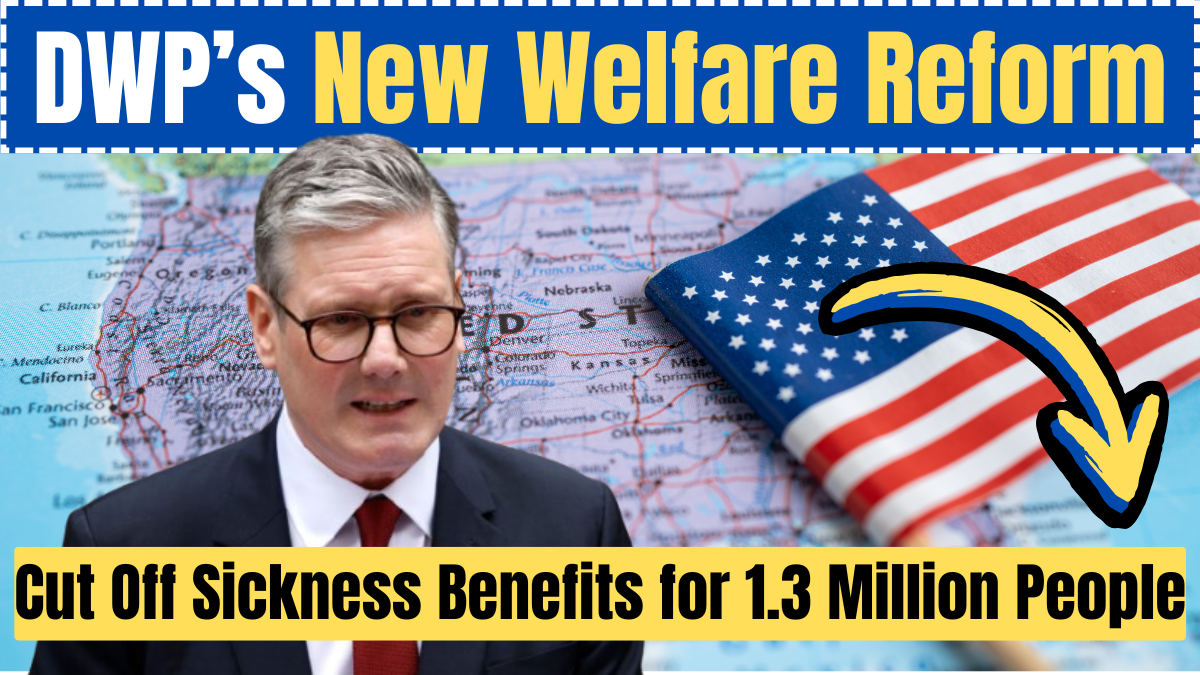The UK government is introducing major welfare reforms that could strip 1.3 million people of their sickness benefits. The Department for Work and Pensions (DWP) aims to tighten Work Capability Assessments (WCA) in an effort to reduce welfare spending by £3 billion. While the government insists these changes will encourage people to re-enter the workforce, critics warn that disabled individuals and those with chronic illnesses may face severe financial hardship.
These changes include stricter assessment criteria, a new sick pay guarantee for low-income workers, and additional job support programs. If you’re currently receiving sickness benefits, here’s what you need to know to protect yourself.

Key Changes in the DWP’s New Welfare Plan
| Aspect | Details |
|---|---|
| Number of People Affected | Approximately 1.3 million sickness benefit recipients. |
| Work Capability Assessments (WCA) | Assessments will become stricter, making it harder to qualify for financial aid. |
| Financial Impact | Some recipients may lose up to £5,000 annually due to reassessment. |
| Government’s Goal | Reduce welfare spending by £3 billion, including £1.3 billion from disability benefits. |
| New Sick Pay Guarantee | 1.3 million low-income workers will receive 80% of wages from day one of sickness. |
| Support for Job Seekers | New employment training programs, mental health support, and workplace accommodations. |
| Impact on Employers | Companies may need to adjust policies due to expanded sick pay eligibility. |
| Advice for Individuals | Seek legal and financial advice to prepare for potential reassessments. |
The government insists that these changes will promote self-sufficiency, but many argue they undermine financial stability for those unable to work.
Stricter Work Capability Assessments (WCA) Could Limit Benefits
The Work Capability Assessment (WCA) determines whether an individual is eligible for sickness benefits such as Employment and Support Allowance (ESA) and Universal Credit.
What’s Changing?
- The new rules tighten assessment criteria, making it harder to qualify.
- More individuals will be reassessed and may lose their financial support.
- Certain conditions, such as mental health disorders and mobility issues, may no longer be considered as limiting work capability.
Who’s at Risk?
- Individuals with chronic illnesses, mobility impairments, and mental health conditions may face stricter reviews.
- Those deemed “fit to work” despite medical conditions could lose financial aid.
Disability organizations warn that these changes could leave thousands without essential support, making daily survival more challenging.
Financial Risks: Disabled Individuals May Lose Up to £5,000 Annually
The DWP’s new guidelines mean that thousands of benefit recipients could lose their financial support, with some seeing annual losses of up to £5,000.
What This Means for Vulnerable Groups
- Increased financial hardship for those unable to work.
- Higher stress levels and worsening health conditions due to uncertainty.
- More pressure on charities and social services to assist those affected.
For individuals dependent on sickness benefits, these cuts could drastically impact their quality of life.
New Sick Pay Guarantee for Low-Income Workers
One of the few positive aspects of the reform is the introduction of a sick pay guarantee. Currently, workers earning below £123 per week do not qualify for Statutory Sick Pay (SSP).
How This Will Change
- 1.3 million low-income workers will now be eligible for 80% of their wages from day one of sickness.
- This provides greater financial security for those in precarious jobs.
- Employers may need to revise workforce policies to accommodate these changes.
While this guarantee helps low-wage workers, it does not compensate for the loss of long-term sickness benefits for disabled individuals.
Public Reactions and Controversies
These reforms have sparked widespread debate, with both supporters and critics voicing strong opinions.
Supporters Say:
- Encourages people to re-enter the workforce and regain independence.
- Reduces welfare dependency, ensuring the sustainability of the benefits system.
- The sick pay guarantee is a step toward fairer workplace protections.
Critics Argue:
- Many people with severe disabilities will lose essential support.
- Mental health conditions may be undervalued in assessments.
- Cuts could increase poverty and homelessness among vulnerable groups.
Advocacy groups have already begun challenging the new reforms, arguing that they may violate human rights protections for disabled individuals.
What Can Affected Individuals Do?
If you receive sickness benefits, here’s how to prepare for these changes:
- Stay Informed: Regularly check the DWP website and news sources for updates.
- Seek Legal Advice: Contact organizations like Citizens Advice for guidance on appeals and reassessments.
- Gather Medical Evidence: Ensure you have up-to-date documentation from healthcare providers to support your case.
- Explore Employment Support: Consider government-funded job training programs that may improve career prospects.
- Join Advocacy Groups: Engage with disability rights organizations that are actively challenging these reforms.
The Road Ahead: What to Expect
These welfare reforms will reshape the UK’s benefits system, affecting millions of claimants. While the government sees this as a cost-saving strategy, critics argue it places undue burden on those who genuinely need financial assistance.
For individuals facing reassessment, the best course of action is to stay informed, seek advice, and prepare for potential changes in their benefit status.
Click here to know more.
Aanchal is a passionate writer with a keen interest in storytelling, content creation, and creative expression. She enjoys exploring diverse topics and crafting engaging narratives that captivate readers.